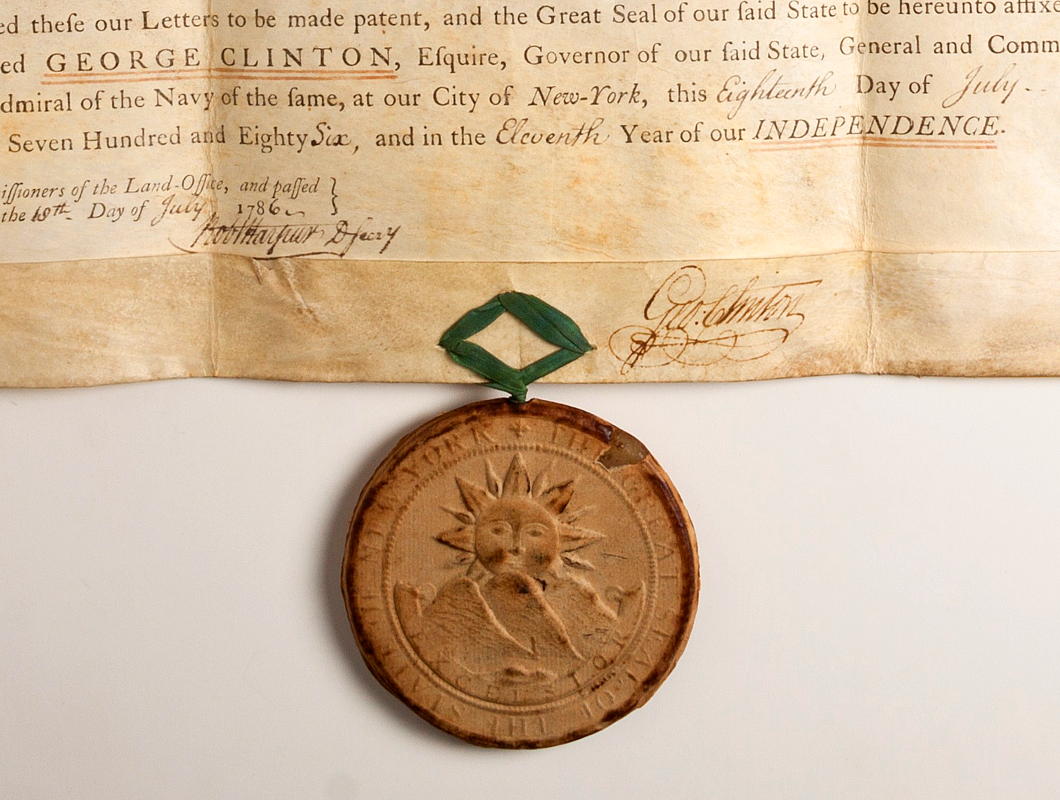Tradition
About Andrew Cusack
 Writer, web designer, etc.; born in New York; educated in Argentina, Scotland, and South Africa; now based in London.
Writer, web designer, etc.; born in New York; educated in Argentina, Scotland, and South Africa; now based in London. read more
News
Blogs
Reviews & Periodicals
Arts & Design
World
France
Mitteleuropa
Knickerbockers
Argentina
The Levant
Africa
Cape of Good Hope
Netherlands
Scandinavia
Québec
India
Muscovy
Germany
Academica
Katalin Bánffy-Jelen, R.I.P.
I have the poet Ben Downing to thank for putting me on to the great Hungarian writer Miklos Banffy. I will always be grateful.
But the one to whom I should be even more grateful is the writer’s daughter Katalin Bánffy-Jelen who died last month, 100 years old.
She, along with Patrick Thursfield (d. 2003), translated the great Transylvanian trilogy from Hungarian into English.
There were obituaries in The Times and the Daily Telegraph.
After the war, Katalin married a US naval officer and they settled in Tangier, still then a free port under a sort of multinational administration.
I wonder if she would have known Fra’ Freddy’s father when he was British delegate to the International Legislative Assembly of Tangier.
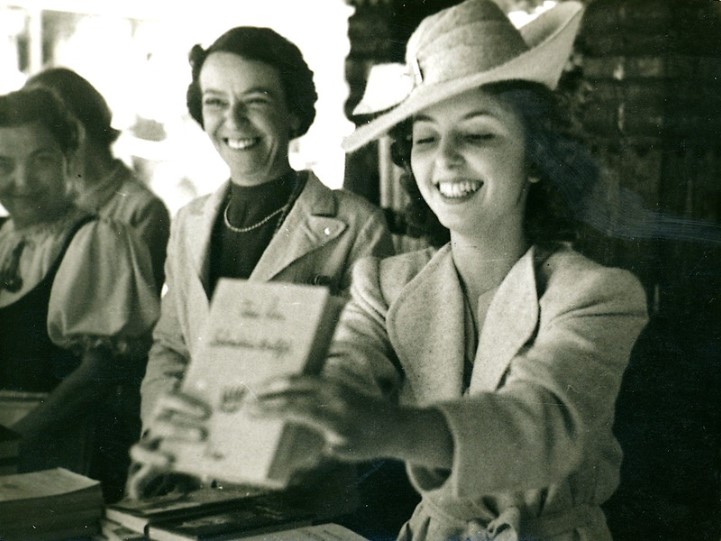

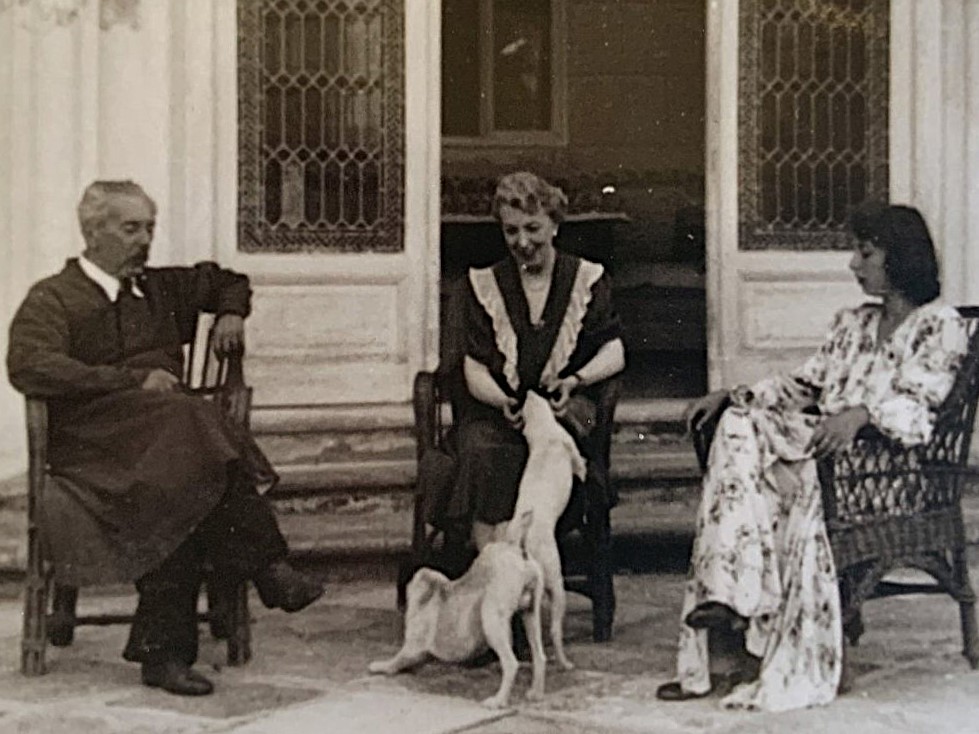
Spooks’ Crown
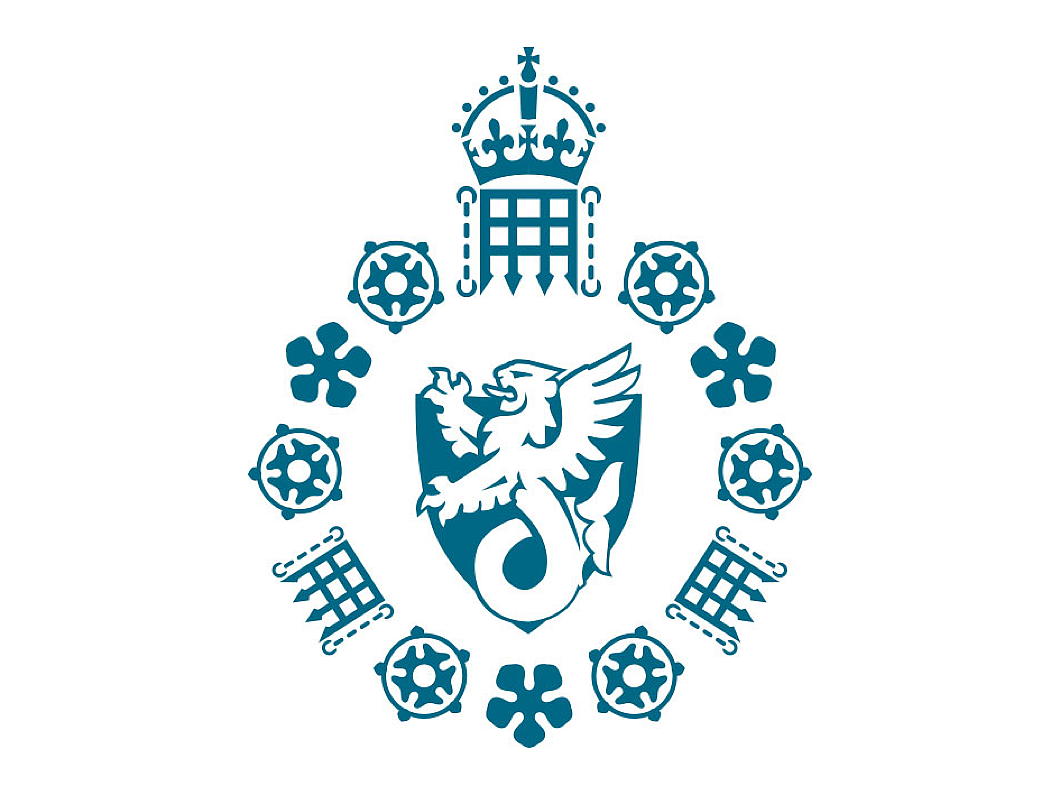
The Security Service, better known as “MI5” has changed its badge to incorporate the change from the St Edward’s Crown to the Tudor Crown that King Charles III has adopted.
The badge was designed by Lt-Col Rodney Dennys who himself had worked for the Security Service’s more glamorous rival, the Secret Intelligence Service (MI6). Dennys had started out in the intelligence game at the Foreign Office and was posted to the Hague before the war. When the Germans rolled in he was on one of the last boats to make it to Britain.
The MI5 emblem was approved by Garter King of Arms in 1981 but (like MI6) the Security Service was still so secret that it did not officially exist, so it was added to the secret roll of arms kept under lock and key in the depth of the heralds’ college in the City of London.
In 1993, after the Service’s existence was formally acknowledged, the badge became known and a flag bearing it often flies from the top of Thames House.

GCHQ has likewise adopted the Tudor Crown, but SIS has not publicly acknowledged any official emblem. (Perhaps it has its own entry in the heralds’ secret roll?) As such, MI6 uses a government version of the royal coat of arms, but theirs has yet to swap crowns.

Christ Church

Christ Church
Lancaster County, Commonwealth of Virginia
Nonetheless, this gem of the American Georgian building arts — designed by an unknown hand — is an almost miraculous survival.
It was built 1732-35 by Col. Robert “King” Carter, the planter and merchant lord who served as Speaker of the House of Burgesses, President of Virginia’s Privy Council (the Governor’s Council or Council of State), and eventually Acting Governor of the Dominion.
The regal moniker by which he was known reflected the wealth and power he obtained in the colony, and Christ Church was constructed to serve Carter’s country seat at Corotoman.
The substantial mansion had burned down in 1729 but Carter carried on, living in the dower house of the estate. Such was his wealth that the fire barely featured in his diary, though he much lamented the complete loss of the wine cellar.
Christ Church had no natural parish and the loss of supporting glebe lands after the Church of England was disestablished in Virginia in 1786 removed the main source of funds to maintain the church.
It was only intermittently used during the nineteenth century, but in 1927 the Association for the Preservation of Virginia Antiquities took charge of the site and began restoring Christ Church.
In 1958 that esteemed body erected the Foundation for Historic Christ Church which has devoted its attention and resources to the care of this Georgian treasure ever since.
This work has by no means been limited to architectural preservation: the Foundation promotes scholarly research on the Carters, the world of the Virginia plantations, and every aspect thereof, in addition to operating a museum on the site to explain Christ Church to visitors and travellers.
Thanks to the efforts of Edmund Berkeley Jr (1937-2020) — who carried on the work of his uncle Francis L. Berkeley (1911-2003) on Virginia’s colonial papers — the surviving diary, correspondence, and papers of “King” Carter are now in the care of the Historic Christ Church museum.
Most importantly, God is still worshipped in some form at Christ Church: the Episcopalian congregation in Kilmarnock, Va., holds Sunday morning services here from June through September according to ‘Rite One’ of the Protestant Episcopal Church’s Book of Common Prayer.
The church is best approached through the simple avenue of cedar trees that leads the visitor straight to Christ Church’s west door.
It looks particularly cozy in winter.

and Michael Kotrady via Wikimedia Commons (modified).
A Christmas Gift from the Governor
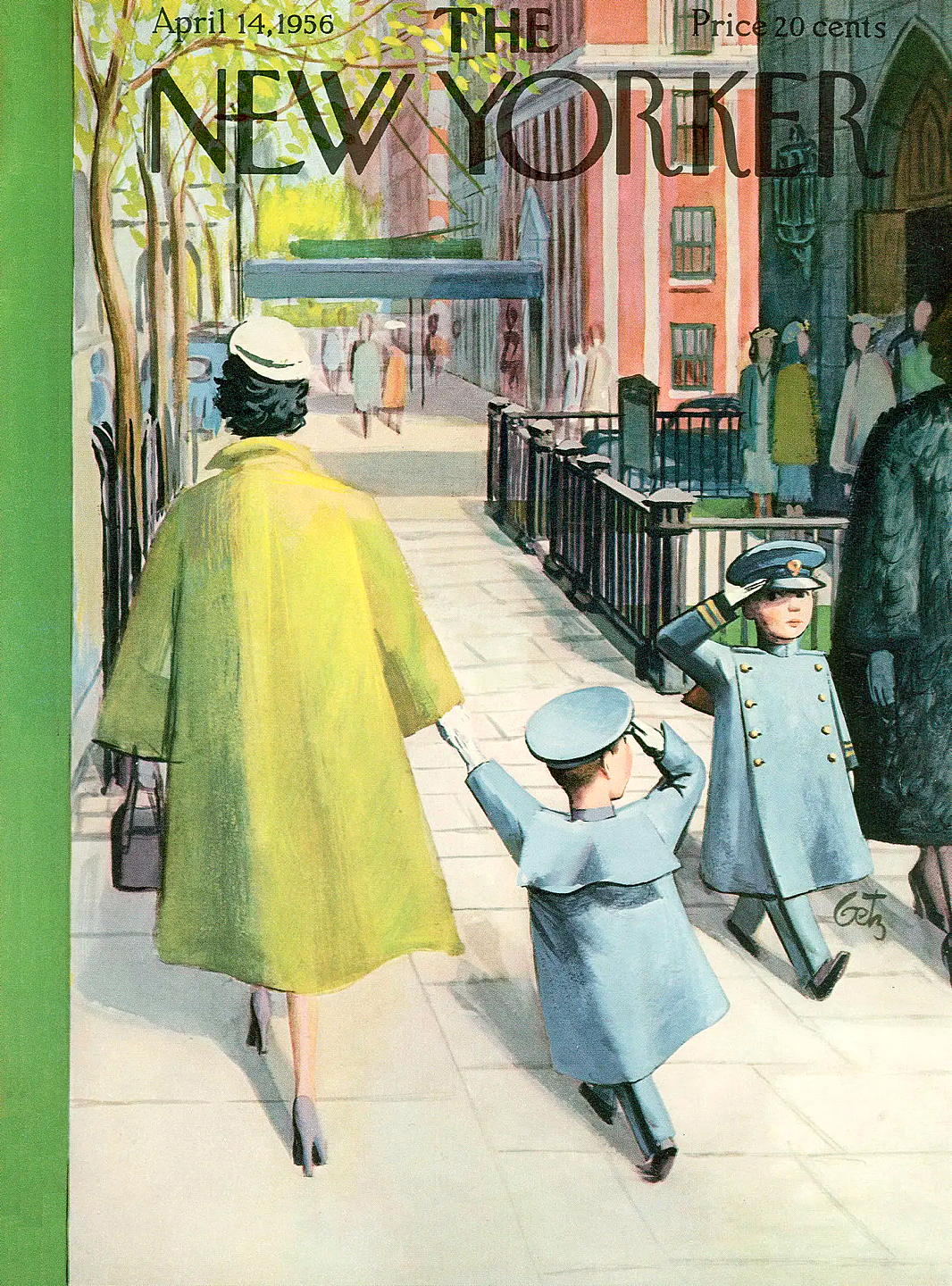
Just in time for Christmas: some excellent news for the Knickerbocker Greys.
Her Excellency the Governor of the great Empire State of New York has signed into law a requirement that this venerable Manhattan cadet corps be allowed to remain in its quarters at the old Seventh Regiment Armory (as The New York Sun reports).
Over recent years the Park Avenue Conservancy has restored the building — a gem of American architecture and interior design — but also effectively expelled the military units still based at the Armory.
The Greys managed to hold out in their “800-square-foot broom closet” (as the New York Post described it) but the Conservancy moved to evict the youth group in 2022. The Greys have fought the eviction in court.
In June a bipartisan bill guaranteeing the Knickerbocker Greys “access and use for permanent headquarters” of the Armory “for the purposes of programming during periods which are not periods of civil or military emergency” passed in the State Assembly and Senate but has only now been signed into law.
The hope is this new legislation will persuade the Conservancy to drop their eviction proceedings which the Greys have been challenging.

Gellner’s Prague

He was Professor of Philosophy, Logic, and Scientific Method at the London School of Economics before heading to Cambridge to become the William Wyse Professor of Social Anthropology. With the Velvet Revolution and the fall of communism, Gellner returned to his native Prague as head of the new Centre for the Study of Nationalism there.
Gellner had many intellectual enemies — proponents of linguistic philosophy, Western Marxists, the post-colonialist offspring of Edward Saïd — but his hard-hitting attacks on them were often tempered by good humour and a skilful ability to tell a joke that only further infuriated his opponents.
The sociologist David Glass once said that he wasn’t sure whether the next revolution would come from the right or from the left, but he was quite sure that wherever it came from the first person to be shot would be Ernest Gellner.
Despite living most of life in exile, Gellner was above all a child of old Prague. Professor Stefan Collini explored the professor’s background in Bohemia in the LRB:
His parents were assimilated German-speaking Jews, Habsburg subjects before 1919, and thereafter citizens of the new state of Czechoslovakia (where it seemed wise to speak Czech, at least in public).
Prague in the interwar years was cosmopolitan even by the standards of Central Europe: alongside Czech schools, it could boast German gymnasia, Russian and French lycées, and an English grammar school.
It was to the last that his parents sent the nine-year-old Ernest in 1935, perhaps prudently preparing for a time when they would have to flee mainland Europe. They almost left it too late; they were fortunate to make it to England in April 1939, eventually settling in Highgate.
Gellner’s parents were representative of that stratum of educated, middle-class Jews who, profoundly grateful to Britain for providing them with a home, nonetheless continued throughout the war to speak to each other in the language of the now hated enemy.

Before his 1995 death, Gellner was interviewed by John Davis for the February 1991 issue of Current Anthropology.
In the exchange, he touched upon his relationship with Prague, the “Crown of the Realm”.
EAG: My family lived in Prague, and we were deeply urban, yes.
JD: Was Prague particularly anti-Semitic?
EAG: Yes. Very openly so in the working class, nauncé elsewhere.
This was Kafka’s Prague: tricultural, with two universities, a Czech and a German. The German university was very, very distinguished and had at one time Carnap and Einstein and so on, and of course benefited from Hitler by the influx of scholars. Two universities and three cultures and ethnic tension was certainly very emphatically part of it. I mean: if you are asking me whether this was a crucial part of my environment in Prague, then the answer is yes.
It’s a stunningly beautiful town, and during the first period of my exile, which was during the war, I constantly used to dream about it, in the literal sense: it was a strong longing. We came to England in 1939 after the German occupation of Prague.

EAG: One of my main recollections of Prague in ’45 was a communist poster saying “everyone with a clean shield into the Party,” that is, everyone whose record was good during the Occupation.
It meant in reality exactly the opposite: “If your shield is absolutely filthy we’ll scrub it for you; you are safe with us; we like you the better because the filthier your record the more we have a hold on you.” So all the bastards, all the distinctive authoritarian personalities, rapidly went into the Party, and it rapidly acquired this kind of character.
So what was coming was totally clear to me, and it cured me of the emotional hold which Prague had previously had over me. I could foresee that a Stalinoid dictatorship was due: it came in ’48. The precise date I couldn’t foresee, but that it was due to come was absolutely obvious for various reasons.
Above all, in ’45 the Czechs expelled 3,000,000 Germans with considerable brutality. I think the estimate of the number of killed in the process was 200,000 thought I don’t know how reliable that is. And at the same time everyone was scared stiff of the Germans and remembered Munich, so they handed themselves bound and helpless to Stalin as the only protection against the German revanchism which they confidently expected at the time.
They don’t expect it now, interestingly enough; but they did then. All this occurred in conjunction with the quite skilful communist exploitation of the situation. And I wanted no part of it and got out as quickly as I could and forgot about it.

The Secret Chapel of Harkness Tower

Yale’s Harkness Tower is, by my estimate, the finest tower in the United States and its designer, James Gamble Rogers, one of the best American architects of his day. JGR is in the Pantheon of his craft, though not quite as highly appreciated as Bertram Grosvenor Goodhue or Ralph Adams Cram.
Harkness Tower is a monument to verticality: from the ground up at each and every stage you expect it could end right there in completeness and beauty — but then it goes another stage higher. Rogers was inspired by the “Boston Stump” of St Botolph’s Church in Lincolnshire but he took that form and creatively expanded and elaborated upon it.
The tower rises 216 feet — one foot for every year Yale existed by the time of its construction.

Yalies – “Elis” – are inveterate founders of drinking clubs which, in order to cultivate a deliberate air of inscrutable mystery, they call “secret societies”, even though many of them are (thankfully) nothing which might rightly be called such.
It was years ago on one of my occasional stays in New Haven for some convivial merriment organised by just such a cabal that my old friend A.B. and I were passing Harkness Tower and I was expounding upon its beauty.
“You know, of course,” A.B. alleged, “it has a secret chapel in it.” I had no such knowledge, and pressed for more information. “Well it’s not quite a chapel, but it feels like one. The university almost never lets anyone use it.”
Universities never do. Once a university has anything, they do their best to stop people using it. (Anyone at Edinburgh University: just try throwing an event in the Raeburn Room in Old College and find out.) (more…)
Season’s Greetings from the Seventh

Alas, the Seventh Regiment Mess is no more, though we had a few family Christmas-time (and other) celebrations there in its final years.
Happy days when Linda MacGregor was at the helm of it.
Make Merry in thy Festival

I nipped over to Civitas in Tufton Street yesterday for the launch of Esmé Partridge’s report Restoring the Value of Parishes: The foundations of welfare, community, and spiritual belonging in England.
She has produced a succinct and well-researched overview of the crisis facing Church of England parishes not just in rural areas but in our towns and cities too.
The discussion following had strong contributions from Danny Kruger MP, Imogen Sinclair, the Rev’d Marcus Walker of Great St Bart’s, Rebecca Chapman who sits on the Anglican Church’s General Synod, Eddie Tulasiewicz of the National Churches Trust, Bijan Omrani, and more.
As a devotee of England’s cult of the saints, what interested me particularly was the contribution from Rupert Sheldrake of the Choral Evensong Trust.
 He explained that the CET was doing its bit for parish churches by creating a Patronal Festival Grants scheme to encourage more churches to celebrate the feast of their patron saint or dedication.
He explained that the CET was doing its bit for parish churches by creating a Patronal Festival Grants scheme to encourage more churches to celebrate the feast of their patron saint or dedication.
Grants of up to £500 are available to provide for choral evensong sung by a visiting choir and – deeply important – a party afterwards at which food and drink are free to those gathering.
“For example,” the Trust informs us, “at St Michael and All Angels in Dinder, near Wells, over ninety people attended a choral evensong on Michaelmas, sung by the Wells Cathedral Chamber Choir. The church was filled to capacity, with many attendees participating in church activities for the first time.”
This is a genius scheme for encouraging greater devotion to the saints as well as more frequent use of now sadly often shut C-of-E parish churches.
As it says in Deuteronomy, “thou shalt make merry in thy festival time, thou, thy son, and thy daughter, thy manservant, and thy maidservant, the Levite also and the stranger, and the fatherless and the widow that are within thy gates.”
More information on the CET’s 2025 Patronal Festival Grants can be found here and the deadline for next year’s applications is Candlemas (2 February 2025).
That evening I was a guest at high table in an Oxford college which is exhibiting signs of health and societal repair.
A few years ago, the head of house disregarded the strident protests of the students and banished the college grace as well as all dress codes for dining. (To the gratitude of many, she did not last long.)
After this unwelcome interruption, the college grace before meals has now been restored (in Latin), in addition to the return of formal meals with gowns (and, on Sundays, black tie).
In some place, where you let it and protect it, nature is healing.
Meanwhile, below, some beautiful music for Advent from my own parish church, St George’s Cathedral in Southwark.
This beautiful performance of Veni, Veni, Emmanuel by Malakai from St George’s Cathedral Choirs, performed at St George's Cathedral is a reminder that Jesus is God with us who witnessed to the love of the Father by dwelling among us.@StGeorgesCath @StGeorgesChoirs pic.twitter.com/L8VY31FmNA
— Archdiocese of Southwark (@RC_Southwark) December 5, 2024
Articles of Note: 11 November 2024

Caro had been a Nieman Fellow at Harvard studying urban planning and land use when he came up with the idea for the book. He thought it would take him nine months, but extensive research and over five-hundred in-person interviews meant it took eight years to complete.
Caro then started working on his study of Lyndon Baines Johnson, the first volume of which emerged in 1982 and the fifth (and final?) one he is still working on. (At the end of the fourth, LBJ had just become president.)
But where does he write? Christopher Bonanos of New York magazine finds out:
It’s an ageless space, one where it could be last week or 1950 inside, matter-of-fact and utilitarian. A couple of bookcases, a plywood work surface, corkboard with outlines tacked up, an old brass lamp, an underworked laptop for emails, a Smith-Corona typewriter. The desk chair is hard wood with no cushion. There’s a saltshaker next to the pencil cup for when Ina brings a sandwich out at midday. The desk has a big half-moon cutout, same as the one back in New York, so he can rest his weight on his forearms and ease his bad back. That arrangement was recommended by Janet Travell, the doctor who grew famous for prescribing John F. Kennedy his Boston rocker. She, with Ina, is a dedicatee of The Power Broker.
He bought the prefab shack, he says, from a place in Riverhead for $2,300, after a contractor quoted him a comically overstuffed Hamptons price to build one. “Thirty years, and it’s never leaked,” he says. This particular shed was a floor sample, bought because he wanted it delivered right away. The business’s owner demurred. “So I said the following thing, which is always the magic words with people who work: ‘I can’t lose the days.’ She gets up, sort of pads back around the corner, and I hear her calling someone … and she comes back and she says, ‘You can have it tomorrow.’”
Does he write out here every day? “Pretty much every day.” Weekends too? “Yeah.” Does he go out much while he’s on the East End? “We have two friends who live south of the highway, and I said to Ina, aside from them, I’m not going this year.” There are other writer friends nearby in Sag Harbor, and they get together, but at this age, Caro admits a little sadly, they’re thinning out. He’ll be 89 this fall.
■ George Grant is a still-underappreciated giant of political thinking in the English-speaking world. He is too little known outside his native Canada, which he sought to defend from the undue overwhelming influence of its sparkling and glamourous southern neighbour. Next year marks the sixtieth anniversary of his Lament for a Nation.
Of all people, a research fellow at Communist China’s Institute for the Marxist Study of Religion — George Dunn — has written a thoughtful introductory overview of Grant’s life and thinking: George Grant and Conservative Social Democracy in Compact.
■ Katja Hoyer mused on an overlapping theme in a recent Berliner Zeitung column which she has helpfully presented in English as well:
A diplomat close to the SPD recently told me that he couldn’t understand why working-class people in particular voted for the AfD. Things weren’t so bad for them, after all. I didn’t bother pointing out that rampant inflation, high energy prices and rising rents have had a hugely detrimental effect on the living standards of people with low and middle incomes because his analysis completely misses the point.
Germany’s working-class voters, Katja argues, feel forgotten by the parties founded to represent them.
■ Since the fall of the Berlin Wall — and earlier in Angledom — political conservatism has effectively been taken over by economic liberalism.
This has denied the centre-right from learning from and deploying useful experience from outside liberalism, with the wisdom of figures as varied as Benjamin Disraeli, Giorgio La Pira, Charles de Gaulle, and Thomas Playford essentially ignored or sidelined.
Kit Kowol’s new book Blue Jerusalem: British Conservatism, Winston Churchill, and the Second World War explores the visionary side of wartime Conservatism. Dr Francis Young offers his take on Tory utopias in The Critic.
■ From a similar era, Andrew Ehrhardt writes at Engelsberg Ideas on Ernest Bevin and the moral-spiritual dimension of British foreign policy.
■ Our friend Samuel Rubinstein has studied at Oxford, Leiden, and the Sorbonne — technically the oldest universities in their three respective countries (although we all know that Leuven is in fact the doyen of Netherlandish academies).
Sam offers an incredibly interesting comparison of the experiences of these three institutions in a humble essay on his Odyssean education:
I arrived in Leiden, armed with my phrase-book, with some ambitions of learning Dutch. The first blow came at the Starbucks in the train station, when the barista answered my Ik wil graag in English without hesitating. The second came the following day when I tried again, at a different café – only this time it seemed that the barista (Spanish? Italian?) didn’t know much Dutch either: even the natives were placing their orders in English. So I gave up – save one hobby, reading Huizinga in the original. I got myself an attractive coffee-table edition of Herfsttij and managed a page or so a day, strenuously piecing it together from my English, German, and smattering of Old English. I still haven’t the faintest idea how to pronounce any of it.
■ And finally, those of us who love Transylvania will enjoy Toby Guise’s summary of the Fifth Transylvanian Book Festival in The New Criterion.
The Lithe Efficiency of the Old Constitution
There is a wonderful glimpse of the old days in the memoirs of the late Lord Waddington (1929-2017).
David Waddington was a Lancashire man who became a lawyer, Member of Parliament, Government Chief Whip, Home Secretary, peer of the realm, and eventually Governor of Bermuda. (In that final role, he was the last of the big dogs — all the ones since have been civil servants.)
The old British constitution — before New Labour’s ill-judged reforms — had a lithe efficiency in those days aptly reflected in quite how few people were employed by the highest court in the realm — and how unfussedly they were officed:
I had only been in the House for two days when I received a telephone call from the clerk of my Manchester chambers asking me if later in the week I was prepared to sit as a deputy County Court judge somewhere in London. This would allow my colleague Bob Hardy, who had contracted with the Lord Chancellor’s Department, to sit as a judge on that day, to take over a brief of mine, a libel action in Leeds.
At the eleventh hour someone pointed out that if I were to sit, my career as an MP would come to an abrupt end because as a result of the House of Commons Disqualification Act I would have disqualified myself from membership of the House, thereby precipitating another by-election. I was then begged by Bob to go and explain to the lady in the Lord Chancellor’s Department why he could not sit and why I had turned out to be an inappropriate replacement.
I set off and, after journeying along many corridors and ascending and descending many staircases, I eventually found a little old lady sitting alone in a tiny office at the bottom of a gloomy stairwell somewhere in the bowels of the House of Lords.
I apologised for troubling her and she said: ‘I can assure you it is no trouble. In fact I am delighted to see you. I have been in this office for thirty-five years and you are the first person who has ever visited me.’
A Prize for the General
France’s Top Military-Literary Prize Awarded to François Lecointre
IT SHOULD surprise no-one that the French Army awards an annual prize for military literature. Since 1995, the Prix littéraire de l’Armée de terre – Erwan Bergot is awarded every year for “a contemporary work of French literature that demonstrates active commitment, of a true culture of audacity in service to the collective whole” and is named in memory of the paratrooper officer, writer, and journalist Erwan Bergot (1930-1993).
 This year’s prize has been awarded to Gen. François Lecointre, the former Chief of the Defence Staff who now serves as the Chancellor of the Légion d’honneur.
This year’s prize has been awarded to Gen. François Lecointre, the former Chief of the Defence Staff who now serves as the Chancellor of the Légion d’honneur.
A graduate of Saint-Cyr, Lecointre’s book Entre Guerres (Between Wars) relays his long service to France in the land forces, including operations in Central Africa, Rwanda, Bosnia, the First Gulf War, and elsewhere.
As a young captain in Bosnia, Lecointre was concerned when his company lost radio contact with the French UNPROFOR observation post on Vrbana bridge early on the morning of 27 May 1995. When he went himself to investigate, Captain Lecointre discovered that Bosnian Serb soldiers in captured French uniforms had seized the post and taken French soldiers hostage.
Lecointre immediately informed Paris, where President Jacques Chirac circumvented the UN chain of command in Bosnia by allowing soldiers under Lecointre’s command to retake the post on the northern end of the bridge with a bayonet charge that overran the Serb-held bunker. Vrbana bridge is believed to have been the last bayonet charge of any French military operation to date.

General Pierre Schill, Chief of the Army Staff, awarded his comrade-in-arms the Prix Erwan Burgot this weekend. The prize includes a monetary award of €3,000 which Gen. Lecointre has donated to the association Terre Fraternité that provides support to France’s wounded soldiers and their families.

Entre Guerres had already won the Prix Jacques-de-Fouchier awarded by the Académie française earlier this year. (Above: Gen. Lecointre with the académicien, lawyer, and writer François Sureau.)

The Erwan Burgot prize’s jury was chaired by Gen. Schill and included the son and widow of Erwarn Burgot, alongside Col. Loïc de Kermabon, Col. Noê-Noël Uchida, the journalist and writer Guillemette de Sairigné, literary figure Laurence Viénot, Général de Division Jean Maurin, Général de Brigade Gilles Haberey, prix Goncourt winning novelist Andreï Makine, writer Christine Clerc, former head army medic Dr Nicolas Zeller, journalist Jean-René Van Der Plaetsen, Professor Arnaud Teyssier, and the historian François Broche.
Articles of Note: 17 September 2024

31½ in. x 59 in.; (link)
The Lebanese banker, writer, journalist, and politician Michel Chiha postulated that Beirut was “the axis of a three-pronged propeller: Africa, Asia and Europe”.
The city’s current airport was inaugurated in 1954, towards the height of its golden years.
In L’Orient-Le Jour, Lyana Alameddine and Soulayma Mardam-Bey report on how Beirut Airport’s story reflects the highs and lows of Lebanon’s history. (Aussi en français.)
■ Another one bites the dust: this time it’s London’s Evening Standard — traditionally the most London of London’s daily newspapers — which recently announced it will move to a single weekly printed edition.
In its heyday there were several editions per day, with “West End Final” on rare occasions topped up by a “News Extra” edition.
Stuart Kuttner, a veteran of the Standard, wrote a beautiful paean to the paper published in the Press Gazette.
■ Samuel Rubinstein shows how historians’ war of words over the legacy of the British Empire tells us more about the moral battles of today than shedding actual light on the past.
■ Wessie du Toit explores the curious columnar classicism persistent across the full spectrum of South African architecture.
■ With union presidents speaking at America’s Republic party convention, Senator Josh Hawley explores the promise of pro-labour conservatism.
■ Also at the increasingly indispensible Compact, Pablo Touzon explores how the Argentine left created Javier Milei.
■ Closer to home, Guy Dampier argues that Britain’s public services, housing, and infrastructure have reached their migration breaking point and the new Government has zero solutions.
■ Meanwhile, five hundred academics have signed a joint letter urging the Labour government not to scrap university free speech laws as the Education Secretary announced they will do.
11½ in. x 16½ in.; (link)
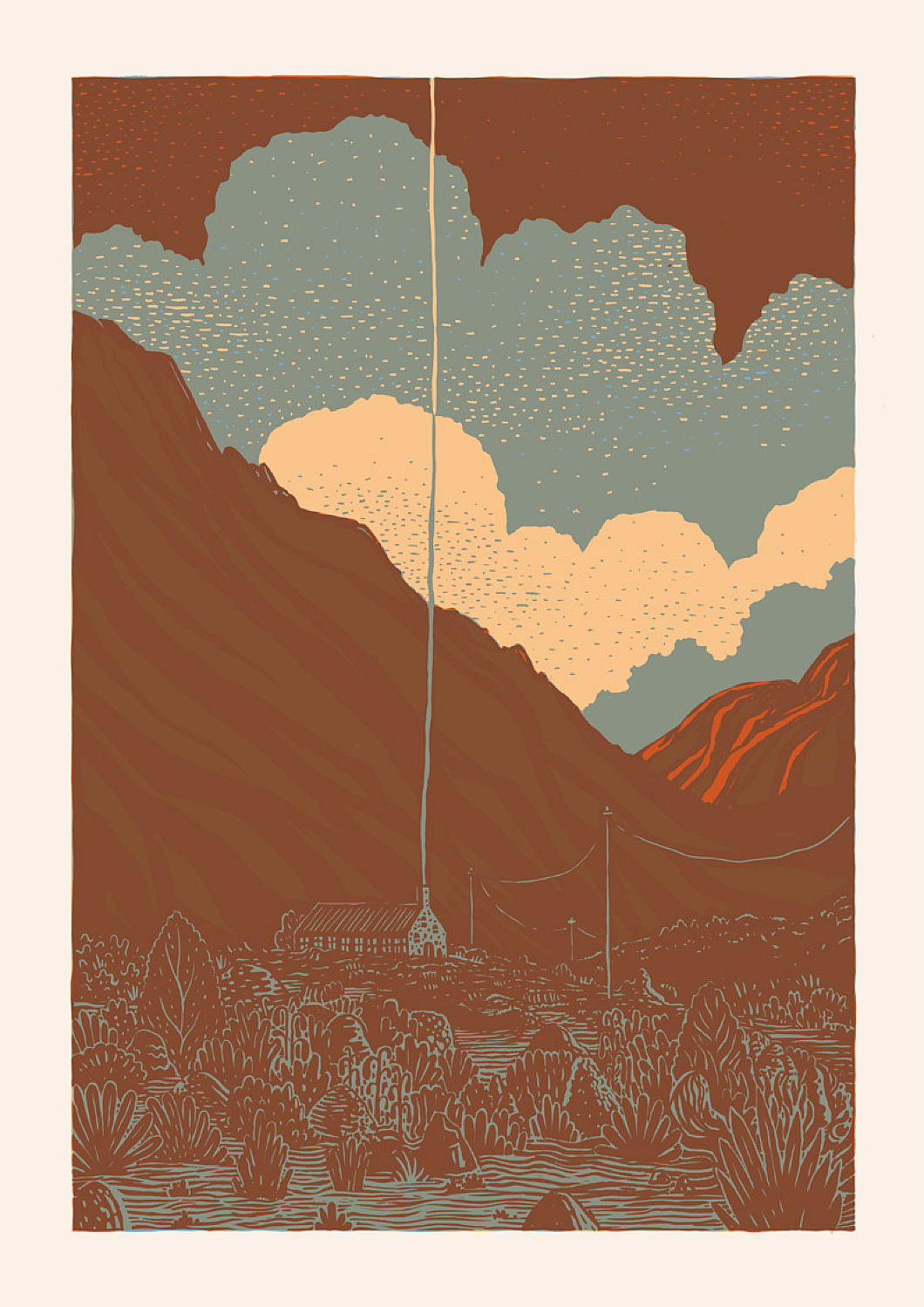
Equality
I find that they’re not true without looking further than myself. I don’t deserve a share in governing a hen-roost, much less a nation. Nor do most people — all the people who believe advertisements, and think in catchwords, and spread rumours. The real reason for democracy is just the reverse. Mankind is so fallen that no man can be trusted with unchecked power over his fellows. Aristotle said that some people were only fit to be slaves. I do not contradict him. But I reject slavery because I see no men fit to be masters.
This introduces a view of equality rather different from that in which we have been trained. I do not think that equality is one of those things (like wisdom or happiness) which are good simply in themselves and for their own sakes. I think it is in the same class as medicine, which is good because we are ill, or clothes which are good because we are no longer innocent. I don’t think the old authority in kings, priests, husbands, or fathers, and the old obedience in subjects, laymen, wives, and sons, was in itself a degrading or evil thing at all. I think it was intrinsically as good and beautiful as the nakedness of Adam and Eve. It was rightly taken away because men became bad and abused it. To attempt to restore it now would be the same error as that of the Nudists. Legal and economic equality are absolutely necessary remedies for the Fall, and protection against cruelty.
But medicine is not good. There is no spiritual sustenance in flat equality. It is a dim recognition of this fact which makes much of our political propaganda sound so thin. We are trying to be enraptured by something which is merely the negative condition of the good life. And that is why the imagination of people is so easily captured by appeals to the craving for inequality, whether in a romantic form of films about loyal courtiers or in the brutal form of Nazi ideology. The tempter always works on some real weakness in our own system of values: offers food to some need which we have starved.
When equality is treated not as a medicine or a safety-gadget but as an ideal we begin to breed that stunted and envious sort of mind which hates all superiority. That mind is the special disease of democracy, as cruelty and servility are the special diseases of privileged societies. It will kill us all if it grows unchecked. The man who cannot conceive a joyful and loyal obedience on the one hand, nor an unembarrassed and noble acceptance of that obedience on the other, the man who has never even wanted to kneel or to bow, is a prosaic barbarian. But it would be wicked folly to restore these old inequalities on the legal or external plane. Their proper place is elsewhere.
We must wear clothes since the Fall. Yes, but inside, under what Milton called “these troublesome disguises,” we want the naked body, that is, the real body, to be alive. We want it, on proper occasions, to appear: in the marriage-chamber, in the public privacy of a men’s bathing-place, and (of course) when any medical or other emergency demands. In the same way, under the necessary outer covering of legal equality, the whole hierarchical dance and harmony of our deep and joyously accepted spiritual inequalities should be alive. It is there, of course, in our life as Christians: there, as laymen, we can obey — all the more because the priest has no authority over us on the political level. It is there in our relation to parents and teachers — all the more because it is now a willed and wholly spiritual reverence. It should be there also in marriage.
This last point needs a little plain speaking. Men have so horribly abused their power over women in the past that to wives, of all people, equality is in danger of appearing as an ideal. But Mrs. Naomi Mitchison has laid her finger on the real point. Have as much equality as’ you please — the more the better — in our marriage laws: but at some level consent to inequality, nay, delight in inequality, is an erotic necessity. Mrs. Mitchison speaks of women so fostered on a defiant idea of equality that the mere sensation of the male embrace rouses an undercurrent of resentment. Marriages are thus shipwrecked. This is the tragi-comedy of the modern woman; taught by Freud to consider the act of love the most important thing in life, and then inhibited by feminism from that internal surrender which alone can make it a complete emotional success. Merely for the sake of her own erotic pleasure, to go no further, some degree of obedience and humility seems to be (normally) necessary on the woman’s part.
The error here has been to assimilate all forms of affection to that special form we call friendship. It indeed does imply equality. But it is quite different from the various loves within the same household. Friends are not primarily absorbed in each other. It is when we are doing things together that friendship springs up— painting, sailing ships, praying, philosophising, fighting shoulder to shoulder. Friends work in the same direction. Lovers look at each other: that is, in opposite directions. To transfer bodily all that belongs to one relationship into the other is blundering.
We Britons should rejoice that we have contrived to reach much legal democracy (we still need more of the economic) without losing our ceremonial Monarchy. For there, right in the midst of our lives, is that which satisfies the craving for inequality, and acts as a permanent reminder that medicine is not food. Hence a man’s reaction to Monarchy is a kind of test. Monarchy can easily be “debunked”; but watch the faces, mark well the accents, of the debunkers. These are the men whose tap-root in Eden has been cut: whom no rumour of the polyphony, the dance, can reach — men to whom pebbles laid in a row are more beautiful than an arch. Yet even if they desire mere equality they cannot reach it. Where men are forbidden to honour a king they honour millionaires, athletes, or film-stars instead: even famous prostitutes or gangsters. For spiritual nature, like bodily nature, will be served; deny it food and it will gobble poison.
And that is why this whole question is of practical importance. Every intrusion of the spirit that says “I’m as good as you” into our personal and spiritual life is to be resisted just as jealously as every intrusion of bureaucracy or privilege into our politics. Hierarchy within can alone preserve egalitarianism without. Romantic attacks on democracy will come again. We shall never be safe unless we already understand in our hearts all that the anti-democrats can say, and have provided for it better than they. Human nature will not permanently endure flat equality if it is extended from its proper political field into the more real, more concrete fields within. Let us wear equality; but let us undress every night.
Rough Notes of Kinderhook
Old Kinderhook is most famous for being the birthplace of the “Red Fox”, Martin van Buren — sometime inhabitant of London and later President of the United States.
He remains the only President who was not a native English speaker, and he spoke with a thick Dutch accent until the end of his days.
If legend is to be believed (and no evidence has been presented compelling us to do otherwise) the town is also the origin of the word “okay” or “O.K.” — for the “Old Kinderhook” clubs that sprung up to support van Buren’s bid for the White House.
Like many towns up and down the Hudson valley, Kinderhook had its own newspaper — originally named the Kinderhook Herald but which later took up the idiosyncratic name of Rough Notes.
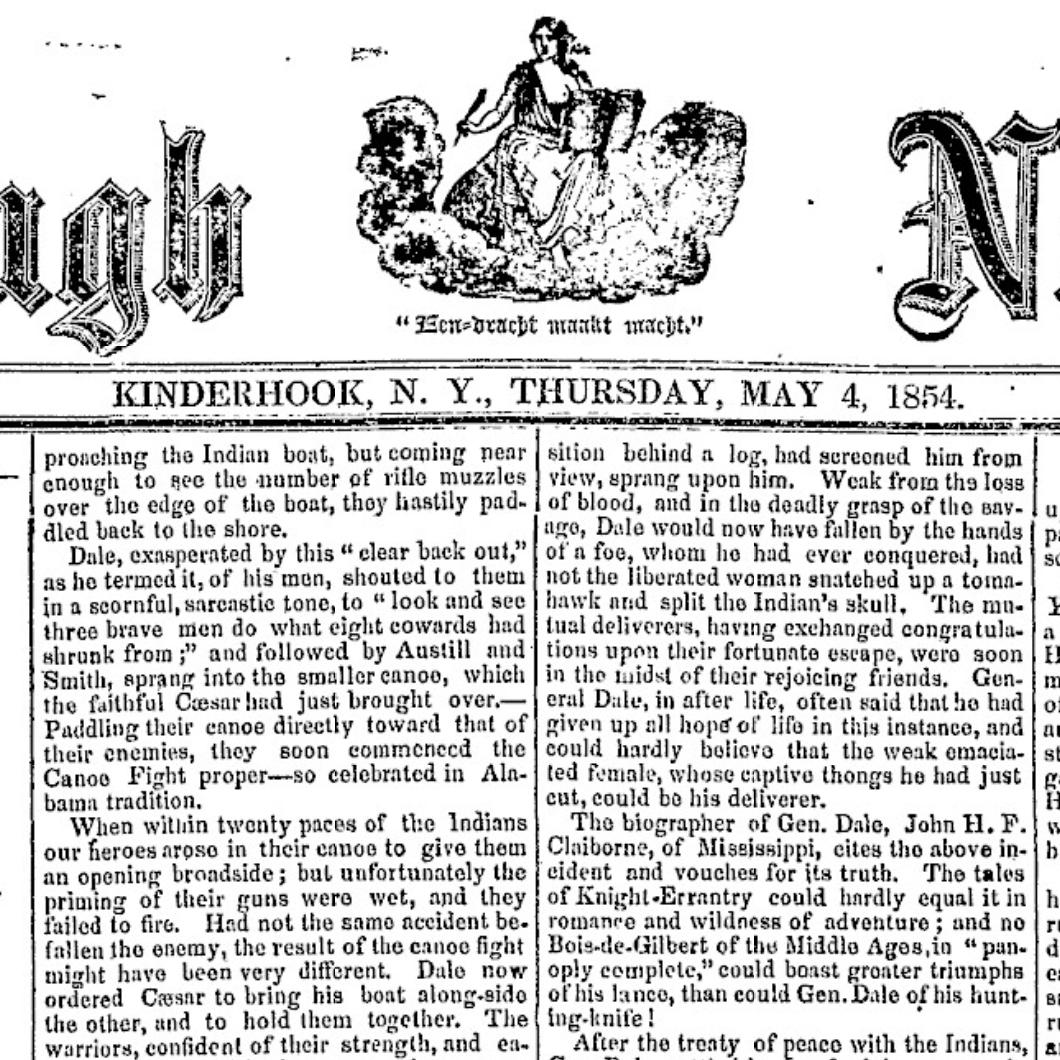
As befits the newspaper of record of an old Dutch settlement, its banner bore the motto Een=dracht maakt macht, a Dutch translation of the old Latin motto of the Seven Provinces that means “Unity makes strength”.
These old and highly localised newspapers were once the chief source of information for people in the surrounding districts and one is pleasantly delighted by the sheer variety of the contents.
In addition to news, agricultural reports, poetry, and the moral and religious column there are reports of the meetings of Congress in Washington and the legislature in Albany, trials for murder, amusing notices from other newspapers in the New World, and news of battles and great events worldwide.
Thanks to the excellent New York State Historic Newspapers online archive you can virtually flip through the pages of this and numerous other periodicals.
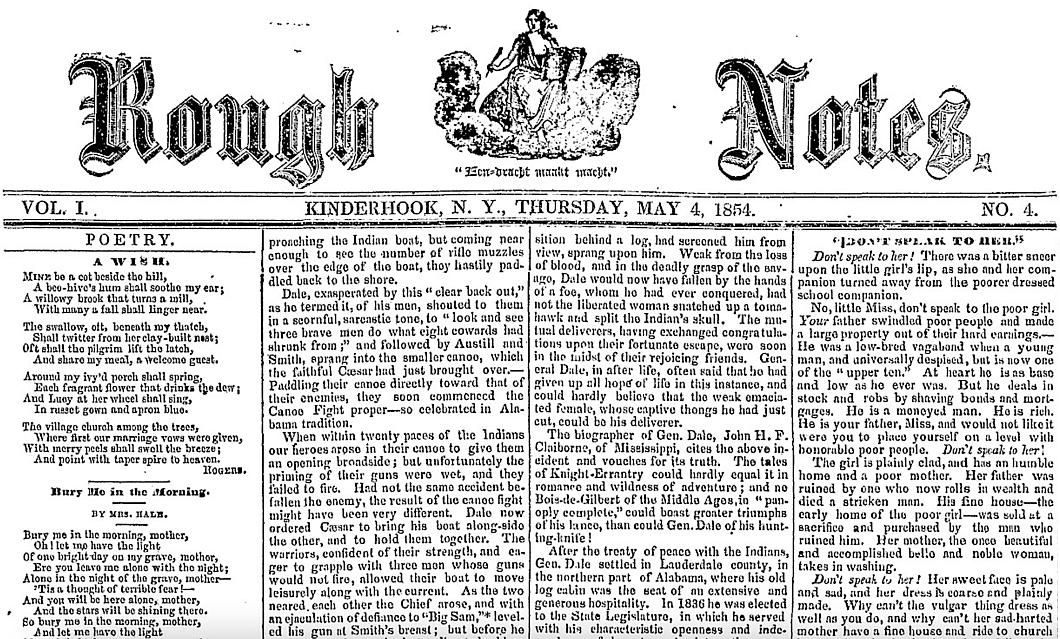
America’s Yacht Ensign
A Seaborne Symbol of Summer
For those of us who had the pleasure of growing up on America’s Eastern Seaboard, there are few icons more emblematic of summer than the United States Yacht Ensign snapping from the back of a sailboat.
An ensign is a maritime flag flown from vessels to show its country of registration. It is always flown from the stern of the vessel, whereas the flag that flies from the bow is called a jack. Naval ensigns are the most common but, depending on which country you’re in, there are also state or government ensigns, civil ensigns for merchant or pleasure vessels, and more.
Given Britain’s long (now somewhat faded) command of the seas, the Royal Navy’s White Ensign and the “Red Duster” of her merchant ships are the most famous ensigns of all.
During the nineteenth century, the United States government had no income tax and collected most of its still very significant revenues from customs duties, tariffs, and import charges. The Treasury Department’s revenue cutters patrolled up and down the Atlantic coast, enforcing duties and boarding vessels to inspect and collect them.
This posed a problem for the increasing fleet of pleasure craft that leisurely sailed the waters of New England, the Chesapeake, and the numerous points in between. There was no way for officials to differentiate between merchant vessels flying the American flag as their ensign and ordinary yachtsmen.
John Cox Stevens, Commodore of the New York Yacht Club, wrote to the Treasury Secretary proposing that private vessels not engaged in trade be exempt from the revenue cutters’ inspections and from clearing customs when entering or departing from American ports. Keen to lighten the load on their own inspectors, the Treasury agreed.
To signify this exemption, the United States yacht ensign was introduced in 1848: a modified form of the original thirteen-stripe, thirteen-star “Betsy Ross” flag with the addition of a somewhat jaunty anchor inside the circle of stars.
As a yacht ensign, it is flown from American private vessels only within home waters: When U.S.-registered boats are sailing abroad they should fly the ordinary fifty-star United States flag as their ensign.
It is not, however, mandatory, so American yachts can fly the ordinary flag as their ensign if they wish. The Revenue Cutters were merged with the United States Life-Saving Service in 1915 to form the Coast Guard — which has its own distinct ensign — so the threat of being raided by Treasurymen is much reduced.
Today the U.S. yacht ensign has become a symbol of American summer as far south as Key West and as up north as Bar Harbor. If you’re feeling yachty, you can even get it on a sweater. (more…)
Royal East African Navy

Among the lesser-known fleets that have, at some point, sailed at least some of the seven seas was the Royal East African Navy (1953-1962).
The origins of the force are from before the Second World War: Kenya’s Royal Naval Volunteer Reserver had been raised in 1933, Zanzibar’s in 1938, and Tanganyika’s in 1939.
During the war and on a purely ad hoc basis, these were combined with other locally raised Royal Navy forces in the region in 1942 as the East African Naval Force. The EANF was given a statutory basis in 1950, and received the royal dignity and title of ‘navy’ in coronation year of 1953.
Headquartered in Kilindini, Mombasa, the post-war REAN was administered through the East African High Commission, a loose meeting of the governors of the colonies of Kenya, Tanganyika, and Uganda which administered railways, ports, postal services, and the telephone and telegraph network.

The Royal Navy guarded its White Ensign jealously, and was not keen on local colonial maritime forces using it.
Ships of the East African Naval Force were granted temporary permission to fly the White Ensign for the duration of the war under specific conditions, but this privilege ended when victory came.
Precedent would suggest a naval force like this fly a blue ensign instead, defaced with the badge of the colony, but the joint nature of this particular fleet precluded that.
As such, it was decided to devise a badge combining the emblems of Kenya (red lion), Uganda (crane), Tanganyika (giraffe), and Zanzibar (dhow) together into a single badge.
This particular example of the East African blue naval ensign flew from HMEAS Mvita and today rests in the collections of the National Maritime Museum at Greenwich.
Election Day
While in the outer world the British people have been electing as their representatives, by the degrading process of universal suffrage, several hundred paid professional politicians, few of them owners of landed property, many of them positively base-born, in the closed world of this column a very different ceremony has been taking place.
In the dark, time-worn Gothic Hall of Assembly, amid crumbling tombs and carved symbols whose inmost meaning few can now read, the Great Feudatories of the Realm have been swearing fealty to the Regent, settling on their broad shoulders once more, for another year, the dreaming loads of Church and State.
In a thousand manors too, throughout the column, the Lesser Feudatories have been receiving the allegiance of village headmen bearing baskets of eggs, indigenous stones and symbolic flowers, of representatives of the craft-guilds – wood-carvers, arquebus-designers and organ-builders prominent as ever – and tenant farmers and yeomen, red-cheeked, bucolic figures in their holiday coats of decent frieze.
After these day-long, solemn ceremonies, rituals so intricate that none but the columnar heralds can understand them, high and low, through all their exact, foreknown, immutable degrees from the Regent to the humblest labourer, feel themselves united, confirmed once more, as the mighty order of society is confirmed.
In the outer world all is ephemeral, unstable, eddying and whirling this way and that in ceaseless, unreasonable change. Within, all is unchanging and unchangeable. As it was, as it is, as it will be, till Judgment Day.
Music, the Hospitallers, and the Tudors

This will take place in the Chapter Room of the Grand Priory of England at 7.00 pm on Thursday 18 July 2024.
All are welcome, and a voluntary contribution of £10 will be collected.
The last of its vintage
The principal city of that part of the world is, was, and presumably ever shall be Mukalla, which gets a mention in the below excerpt written by J. Morris (while still alive).
Sadly, travel to that part of the world is severely frowned upon by the foreign ministries of Western powers at the moment, owing to the continuing unpleasantness between factions bedevilling the Yemen.
If you want to get a boat to Socotra (currently occupied by nos amis les Émiratis), I’m told that these days you’re better off embarking from Oman — but friendly welcomes on the island are far from guaranteed.
Style, of course, was an essential element of ornamentalism, and another cool late practitioner of the 1950s or 1960s was the British Adviser to the Sultan of Mukalla, on the southern coast of Arabia. The title of Adviser was a euphemism. He really ran the place. The Mukalla governing council actually met in his house, and when I stayed there for a time myself, I sometimes used to walk into his drawing-room to find all its members, in their white gallabiyahs, sitting and arguing there on the sofas, sometimes very solemnly, sometimes laughing their heads off, sometimes banging the floor with their sticks or shouting imprecations at the Adviser – who, since he spoke perfect idiomatic Arabic, gave as good as he got.
His administrative style was not in the least authoritarian, or even paternalistic. In fact it was rather bohemian. If he wanted some coffee during those meetings he gave a piercing blast on a silver whistle; this didn’t seem to have any cataclysmic effect, but sooner or later a servant would shamble in with a pot on a silver dish, and as he served the Adviser he would give me a sly collusive smile, amounting almost to a wink.
Every afternoon the Adviser went for a long walk along the sands of the Indian Ocean, followed at a respectful distance by his driver in his somewhat ramshackle Land Rover. At a fast steady pace he would stride along, sometimes swerving to avoid a string of camels, or people digging holes for crabs, or small boys throwing sand at each other, or old men sitting on their haunches chewing. He had a word for them all, and they replied cheerfully in kind, or giggled, and as he disappeared into the distance, his car chugging hopefully along behind, he used to seem to me a summation of all I liked about the British Empire in its last years – for all its faults, generally kind, generally straight, well-intentioned, a bit too pleased with itself perhaps, a bit too slow to recognize realities, a bit lacking in the old splendour, but diligent, courageous and often rather funny.
And yes, there’s one last ingredient of the imperial ornamentalism that I haven’t touched upon – its humour. For my escapist tastes, humour was a saving grace of the British Empire, and I’d liked to end this resolutely escapist essay with a little cameo to illustrate it. The last of the great imperial adventures was the first ascent of Mount Everest, the top of the world, by a British expedition in 1953. This really was an exploit of empire. The climbing team included two New Zealanders, a Gurkha officer, a former officer of the Black Watch, a former Indian Army engineer, one or two Welshmen, from the final colony, and a Sherpa citizen of that archetypical imperial buffer state, Nepal. I went along to write about it for that old broadsheet of Empire, the London Times.
The most glamorous star of the adventure turned out to be the Sherpa, Tenzing Norgay, who actually reached the summit with the New Zealander Edmund Hillary. When we all got back to London we were treated to a very grand banquet by the British Government – the old imperial government. I found myself sitting next to the majordomo of the occasion, a delightful old-school courtier, while opposite me sat Tenzing, out of Asia for the very first time in his life, who could not then read or write, but who looked marvellous.
The old gentleman turned to me halfway through the meal and said he hoped I was enjoying the claret – what the British call red Bordeaux wine. He said it was the last of its vintage in the government cellars, and was probably the last anywhere in the world. Well, I was terribly impressed, of course, and I looked across at Tenzing – who most certainly was enjoying the claret. It was probably the first time he’d ever tasted any wine. The lackeys were filling and refilling his glass, and he was radiant with pride and pleasure. He was a marvellously confident and exotic figure – a prophetic figure, actually.
Presently the old boy turned to me again. ‘Ah’, he said, ‘how very good it is to see that Mr Tenzing knows a decent claret when he has one.’
Sic transit gloria!
Letters Patent
In the collections of the American Numismatic Society — formerly resident at Audubon Terrace but lately removed further south to Varick Street — there is a fine example of letters patent from the year 1786, signed by Governor George Clinton and validated by the Great Seal of the State of New York.
Letters patent are a form of open declaration by a sovereign or head of state, usually conferring the grant of an office, title, land, or rights. The most well-known patents are those covering the intellectual property of scientific inventions, issued by bodies like the United States Patent and Trademark Office or the UK’s Intellectual Property Office.
These particular letters patent deal with a land grant made to one Joshua Mersereau. From a family of Huguenot extraction, Mersereau studied at King’s College and ran a tavern on Staten Island. When America’s first civil war erupted in 1775, he joined the rebels and was commissioned a major in the “patriot” forces. He also represented his island’s coterminous County of Richmond in the rebel Provincial Congress that convened at Kingston.
Alongside other members of his family, Major Mersereau organised an effective spy ring that gathered useful operational intelligence on the movements of British and loyal American forces in the Hudson Valley, Staten Island, and neighbouring parts of New Jersey. It was likely for that contribution, as well as for his political influence more broadly, that this grant of land was made.
Search
Instagram: @andcusack
Click here for my Instagram photos.Most Recent Posts
- Sag Harbor Cinema March 26, 2025
- Teutonic Takeover March 10, 2025
- Katalin Bánffy-Jelen, R.I.P. March 3, 2025
- Substack Cusackiensis March 3, 2025
- In the Courts of the Lord February 13, 2025
Most Recent Comments
Book Wishlist
Monthly Archives
Categories

